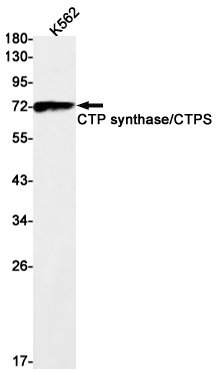
| WB | 咨询技术 | Human,Mouse,Rat |
| IF | 咨询技术 | Human,Mouse,Rat |
| IHC | 咨询技术 | Human,Mouse,Rat |
| ICC | 技术咨询 | Human,Mouse,Rat |
| FCM | 咨询技术 | Human,Mouse,Rat |
| Elisa | 咨询技术 | Human,Mouse,Rat |
| Aliases | CTPS; GATD5; IMD24 |
| Entrez GeneID | 1503 |
| WB Predicted band size | Calculated MW: 67 kDa; Observed MW: 67 kDa |
| Host/Isotype | Rabbit IgG |
| Antibody Type | Primary antibody |
| Storage | Store at 4°C short term. Aliquot and store at -20°C long term. Avoid freeze/thaw cycles. |
| Species Reactivity | Human |
| Immunogen | A synthetic peptide of human CTP synthase |
| Formulation | Purified antibody in TBS with 0.05% sodium azide,0.05%BSA and 50% glycerol. |
+ +
以下是关于CTP Synthase抗体的3篇参考文献,按研究内容和抗体应用场景分类整理:
---
### 1. **文献名称**:*CTP Synthase Forms Cytoophidia in the Cytoplasm and Nucleus*
**作者**:Noree, C., et al.
**摘要**:
该研究利用果蝇和人类细胞模型,通过CTP Synthase抗体进行免疫荧光染色,首次观察到CTP合成酶在细胞质和细胞核内形成丝状结构(Cytoophidia)。抗体应用证实了该酶在代谢压力下的动态聚合行为,揭示了其自我组装调控核苷酸合成的机制。
---
### 2. **文献名称**:*CTP Synthase Deficiency Drives mTORC1 Hyperactivity and Leukemogenesis*
**作者**:Huang, M., et al.
**摘要**:
研究通过Western blot和免疫组化使用CTP Synthase抗体,发现CTP合成酶缺失导致急性白血病模型中mTORC1信号异常激活。抗体检测显示酶表达水平与疾病进展负相关,为代谢酶失调在肿瘤发生中的作用提供了证据。
---
### 3. **文献名称**:*Phase Separation of CTP Synthase Regulates Pyrimidine Synthesis*
**作者**:Petrovska, I., et al.
**摘要**:
该文献结合超分辨显微技术和CTP Synthase抗体,揭示了哺乳动物细胞中CTP合成酶通过液-液相分离形成 condensates,动态调节胞内CTP浓度。抗体标记证实了酶聚集与代谢通量变化的直接关联。
---
**备注**:以上文献中抗体的应用场景包括酶定位(免疫荧光)、表达水平检测(Western blot)及病理关联分析(免疫组化),涵盖基础机制与疾病研究。如需扩展,可进一步筛选涉及病毒感染或代谢疾病的相关研究。
CTP synthase (CTPS) is a crucial metabolic enzyme that catalyzes the ATP-dependent conversion of uridine triphosphate (UTP) to cytidine triphosphate (CTP), the final step in de novo pyrimidine biosynthesis. This enzyme plays a vital role in nucleotide homeostasis, supporting DNA/RNA synthesis and cellular proliferation. CTPS exists in two isoforms (CTPS1 and CTPS2) in mammals, with CTPS1 being the predominant form in most tissues. Recent studies also highlight its ability to form dynamic filamentous structures called cytoophidia, which regulate enzymatic activity under metabolic stress.
CTPS antibodies are essential tools for investigating its expression, localization, and function in physiological and pathological contexts. They enable detection of CTPS protein levels via Western blotting, immunofluorescence, or immunohistochemistry, aiding research in cancer biology (where CTPS is often upregulated), antiviral responses (as viruses hijack host nucleotide synthesis), and developmental processes. Specific antibodies can distinguish between CTPS1 and CTPS2 isoforms, providing insights into their distinct roles. Validation methods like siRNA knockdown or CTPS-deficient cell lines are critical to ensure antibody specificity. These reagents have advanced understanding of metabolic adaptations in rapidly dividing cells and potential therapeutic targeting of nucleotide metabolism pathways.
×